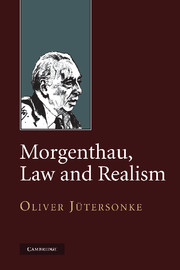Book contents
- Frontmatter
- Contents
- Preface
- Acknowledgements
- Note on the text
- 1 Hans J. Morgenthau in International Relations
- 2 The justiciability of disputes
- 3 Hans Kelsen and the reality of norms
- 4 Legal realism and behaviouralist social science
- 5 Legalism, romanticism and irresponsible statecraft
- 6 The legacy of legal formalism
- Name index
- Subject index
- References
5 - Legalism, romanticism and irresponsible statecraft
Published online by Cambridge University Press: 17 November 2010
- Frontmatter
- Contents
- Preface
- Acknowledgements
- Note on the text
- 1 Hans J. Morgenthau in International Relations
- 2 The justiciability of disputes
- 3 Hans Kelsen and the reality of norms
- 4 Legal realism and behaviouralist social science
- 5 Legalism, romanticism and irresponsible statecraft
- 6 The legacy of legal formalism
- Name index
- Subject index
- References
Summary
As the preceding three chapters showed, Morgenthau was very much a Kelsenian formalist worried about the dangers posed by adherence to the dominant doctrine of legal positivism. This doctrine not only occluded a large part of reality, but also incorporated into its analysis empirically unverifiable elements. By contrast, a truly realist theory of international law, Morgenthau contended, would acknowledge and engage with its social substratum: the political. Anything else would be ‘legalism’, the artificial separation of the juridical sphere from not just the other normative spheres of mores and morals, but also of all insights from the social sciences and psychology. The result was a culture of irresponsible statecraft and the identification of ‘the moral aspirations of a particular state’ with ‘the moral laws that govern the universe’, an identification the fifth principle of political realism explicitly warned against in later editions of Politics Among Nations.1
In his 1940 call for a functionalist approach,2 in Scientific Man vs. Power Politics,3 in various versions of Politics Among Nations and then also in In Defense of the National Interest,4 Morgenthau continuously spoke of this ‘legalism’, of the ‘political ideology of Geneva’, or of the ‘legalistic-moralistic approach’ to international politics. Such language has often been interpreted as meaning that Morgenthau deemed international law to be irrelevant, ‘idealistic’ or ‘utopian’, and taken as a justification for focusing on material capabilities and the distribution of power instead.
- Type
- Chapter
- Information
- Morgenthau, Law and Realism , pp. 146 - 174Publisher: Cambridge University PressPrint publication year: 2010

